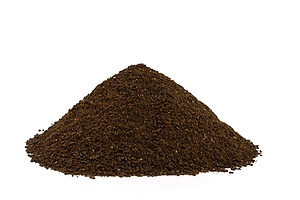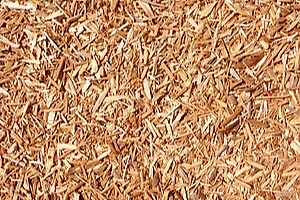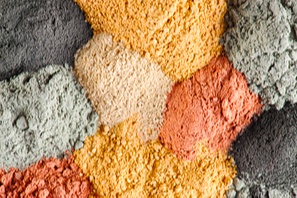 Topsoil is made of a combination of materials, including sand, clay, or organic matter. Additionally, compost, shredded wood (mulch), peat moss and other additives can supplement the overall topsoil quality.
Topsoil is made of a combination of materials, including sand, clay, or organic matter. Additionally, compost, shredded wood (mulch), peat moss and other additives can supplement the overall topsoil quality.
It is helpful to understand what topsoil is made of and how materials such as compost and mulch can help the soil in your yard, especially if you have a garden or take pride in your lawn. Poor topsoil with improper composition can create problems, whereas quality soil can help plants grow by holding moisture into the roots and preventing nutrient loss.
The following is a guide to what topsoil is made of, including information about how each type of material plays an important role in the overall quality and health of the topsoil. The most common materials found in and used along with topsoil include compost, shredded wood, peat moss, sand, clay and various types of microorganisms.
Compost
Compost is a combination of leaves, shredded twigs and other natural elements and plant elements. Its purpose is to enrich the topsoil and subsoil beneath it. To many homeowners, compost is considered black gold because it is great for home gardens. Compost sits on top of the topsoil to ensure healthy soil, and many also appreciate its aesthetic appeal.
It’s worth noting that compost is different from topsoil. While compost can support topsoil, it cannot be used solely as a layer above the subsoil. Compost is generally composed of organic material, although there are some compost solutions that are not organic. To ensure the best results possible, be sure to consider the best type of compost for your needs before applying compost to your topsoil mixture.
Shredded Wood
 If you hear shredded wood mentioned when discussing topsoil, it is likely used to describe a type of mulch. Mulch is most often composed of shredded wood, potentially with other materials mixed in. A thin layer of mulch can be added to the topsoil to protect the soil from excessive moisture loss and to prevent weeds from growing.
If you hear shredded wood mentioned when discussing topsoil, it is likely used to describe a type of mulch. Mulch is most often composed of shredded wood, potentially with other materials mixed in. A thin layer of mulch can be added to the topsoil to protect the soil from excessive moisture loss and to prevent weeds from growing.
Other benefits of shredded wood added to topsoil include improving the fertility of the soil and improving visual appeal. The shredded wood in mulch gives a natural color and appearance that many find attractive. It can also keep weeds away, which further adds to the aesthetic appeal.
Peat moss
Peat moss is often used as an alternative to compost and shredded wood. The appeal of peat moss is its acidic pH, which makes it perfect for plants that grow well in lower pH soil (whereas compost may make for a better option if alkaline soil is needed).
Peat moss is made of layers of decomposed plants, moss, grass and other flora. Among peat moss’s many benefits, perhaps, most notable is its ability to soak up nutrients and moisture and release them into the root of plants. Additionally, peat moss can prevent plant nutrients from getting washed away by stormwater runoff and ensure the plants have the moisture they need to grow during minor droughts.
Sand
Sand is a common material — often associated with beaches — that comes from rock and mineral particles. It is also used in topsoil to help grass and plants grow. You may have heard of sand being used for topsoil. It is important to utilize the proper amount of sand to get the full benefits sand has to offer for topsoil and plants.
Sand can create air pockets in the topsoil, allowing plants more access to nutrients, oxygen and water that it needs to grow. Many topsoil mixtures have sand pre-mixed into it. When the right amount of sand is used, it makes it easier for plants to grow. It is also commonly-used along with topsoil for grading purposes.
Clay
 Many are surprised to hear that clay is a popular material in topsoil, but clay is actually a type of natural soil material consisting of water-trapping minerals. Due to the water density of clay, it is a heavier substance, and it can play a vital role in the health and overall quality of topsoil.
Many are surprised to hear that clay is a popular material in topsoil, but clay is actually a type of natural soil material consisting of water-trapping minerals. Due to the water density of clay, it is a heavier substance, and it can play a vital role in the health and overall quality of topsoil.
The primary benefit of clay is its ability to hold water. Clay can hold large amounts of water throughout the colder winter months, helping ensure plants have the water they need to grow. Clay tends to dry out during the summer months, which is something to be wary of. Clay topsoil also holds higher levels of nutrients than other materials found in topsoil. This can help homeowners who are interested in growing a garden or keeping their lawn looking great all year long.
Microorganisms
Microorganisms are another type of material that makes up topsoil. Soil microbiology refers to the study of microorganisms in soil and the positive or negative impact they have. In most instances, microorganisms such as bacteria, fungi, algae and protozoa help topsoil mixtures. This is because their organic matter releases nutrients that improve the health of the soil. These nutrients are soaked up by plants and can improve the overall fertility of the soil.
Although too many microorganisms in your soil may lead to problems, it is generally a good thing for topsoil to contain microorganisms. The types of microorganisms vary, although a topsoil test may show the types that exist in your lawn and how they impact the overall soil health and quality.
Contact the Dirt Professionals
Call the Dirt Professionals at Dirt Connections today to purchase high-quality topsoil. We take great pride in the quality of our topsoil mixture, and we offer topsoil delivery to Fairfax and the surrounding areas for the most convenient service possible.
Dirt Connections also offers a variety of other services and products, including fill dirt delivery, residential services, commercial services, pool removal and more. You can reach us by phone or email at any time, and we respond to all inquiries as soon as possible. A member of our friendly team will be happy to answer any questions you may have about topsoil or any of our other services.
Summary

Dirt Connections was started with one goal in mind: providing quality residential and commercial construction services to clients on time and on budget. Reach out for more information on how we can support your next project.
For your convenience our estimates are free and by appointment. Call 703-940-9949 for a free estimate today!









































